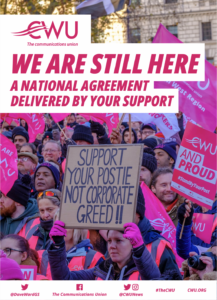Mail Business Recovery, Transition & Growth

‘Back this deal, regroup & prepare for future battles’
Postal, Royal Mail Group (EMP) April 27 2023
CWU Outdoor Secretary and Postal Executive members spell out the detail of the deal to national briefing of union reps from Royal Mail Delivery…
“We wouldn’t be recommending this agreement if there was a better alternative – but this is absolutely the correct way forward at this time,” explained Mark, in reply to a question asking what the union would do if members reject Business Recovery, Transition & Growth in the forthcoming ballot. The national officer for Delivery members was speaking at the Birmingham & District Amal CWU Branch office, where area reps had gathered for a full discussion of the Delivery aspects of the agreement.
Praising the solidarity, unity, determination and fighting spirit of members and reps over the past year, Mark described the dispute as having been “a real emotional roller-coaster” and that the leadership of the company had “acted in a way at times that made no sense.” Their objective, he said, had been “to destroy this trade union – but they haven’t managed to do that and that’s because of you, and all our reps and members.”
He had strong words of criticism for those at the top of Royal Mail, who were the people responsible for the company’s current financial situation – from £758 million in profit last spring, to a loss this year and projected losses for the year ahead – but he reminded the audience that, while it was right to apportion blame to those responsible, this did not change the reality of the highly fragile and perilous financial situation. This was a key reason why the CWU negotiating team had agreed to Business Recovery, Transition & Growth – an agreement that, while containing some key concessions and commitments from the business, also includes some concessions that the union has had to make in the circumstances.
The key objective now, Mark continued, is to win members’ support for the agreement, and to make that agreement work in the interests of workers, of the public and of the company itself going forward. It is also important, in those conversations with members around the country, to emphasis the fact that the alternative to this agreement is not a reversion to our previous agreements. Given that Royal Mail formally served notice on ending a number of our previous agreements, a ‘No’ vote in this forthcoming ballot would leave our members with no agreements in place at all over a whole range of vitally important issues.
As well as Postal Executive vice-chair Mick Kavanagh, who chaired the briefing, Mark was also joined on the platform by three Postal Executive members who work to the Outdoor Department – Tony Bouch, Martin Walsh and Darren Glebocki – each of whom gave presentations alongside Mark on specific sections from the Delivery part of the agreement.
Quality of Service, USO Compliance & Revision Activity (Page 3, Section 2.5, 2.6 of the agreement)
Our Outdoor secretary reported on meetings he had had with Royal Mail’s operations director Ricky McAuley and his team earlier in the week and that he had been told that senior management “want to crack on with further revisions and they say they also want to restore quality of service.” There is a priority joint commitment to this in the agreement, alongside a commitment to ensure future USO compliance – something that has been in the public spotlight in recent months and is an ongoing focus for the investigations undertaken by the Business, Energy & Industrial Strategy (BEIS) House of Commons Select Committee.
“We’ve opened up discussions with the business,” Mark continued “and we’ve got to get over this mantra of theirs that ‘it’s our business to run’. It isn’t just about the words of this agreement – we’ve got to work to bring the words in this agreement to life.”
Each section of the agenda was followed by questions and points of view from the floor and, after this presentation, reps came up from the audience to make their contribution to the debate. Hours taken out of local offices in unagreed revisions, unmanageable workloads and the lack of time allocated for increased new tasks required of delivery workers on their duties were among the issues raised.
Speaking to some of these points, Mark said: “We want to restore quality properly and we’ve got to re-enforce what we mean by those words. Proper engagement is key and we’ve got to make sure this is restored in all units. Management have signed up to this agreement on quality and revisions activity and to act in line with our agreements, including the IR framework. We’re meeting them again very soon and we’ll tell them there’s a lot for them to do on these issues.”
Network Changes Impact on Delivery (Page 19, Appendix 2 of the agreement)
Mark presented details of how Royal Mail’s decision to phase out mail flights will have a wider effect on the whole operation and, for Delivery workers, it will mean changes to start and finish times. But, as a result of the action taken by members and the pressure brought to bear by CWU negotiators, the union has managed to move the company significantly on this aspect.
This has been a major issue of concern for delivery workers and it was high up the agenda at the Birmingham briefing, with many contributors from the floor expressing strong views on the subject, with questions from their members.
“Royal Mail initially demanded that the working day be shifted back by three hours,” explained Mark. “But this has changed markedly. In this agreement, although the last urban letter time is moved to 4.30pm from the current 3.30pm – with effect from March 2024 – it’s important to stress that most deliveries across the UK will still be planned to be completed before 3.30pm, with the vast majority completed by 4pm.”
“In addition to this, we’ve also got commitment within the agreement to work jointly with the company to restrict any movement to a maximum of 60 minutes, through joint working group activity,” he added.
Seasonal variations (Page 13, Appendix 1)
One of the positive aspects of the agreement is the plan for a new system of Seasonal Variations for workers in Delivery, which has been reached as an alternative to the company’s previous demands for annualised hours or so-called ‘flexi-bank’ arrangements. Martin Walsh spoke to the briefing about this and he began by reminding delegates that this had been adopted by the union at its Liverpool Policy Forum early last year.
“We believe this will reduce absorption – which is very unpopular – and also that it will raise productivity,” he said, adding that pilot projects will start at a number of delivery offices around the country at the end of May, with a scheduled joint review in mid-August. If it does come into operation, there will be a 39-hour week at the busiest time of year – from September until Christmas – followed by a 37-hour week that will last until May and then a 35-hour week through the summer, up until autumn comes around again.
On this part of the agreement, reps asked what its impact would be on scheduled attendance, duty patterns and annual leave arrangements. A further point made was that Seasonal Variations, if it proves successful, could help to progress the union’s long-standing policies for further reductions to the working week.
One Parcel Network (P5,S5), Sunday Working (P8,S6.3) & Data Use (P29, App5)
“Effectively, what Royal Mail want to do is merge Parcelforce to establish an optimised single parcel network,” said Mark, adding that this could bring together the planned 346 Royal Mail parcel delivery hubs with the existing 54 PFW depots around the country and that it is crucial that the CWU becomes closely involved with this project, as well as the continued move towards the seven-day delivery service.
For existing employees who were already employed with the company, Sunday working remains voluntary and Sunday premium continues to be paid – but these will not apply for new recruits. And, in the discussion of this section, reps talked about how new members of staff were increasingly being used for this work. One said that this had created a “two-tier workforce” in Royal Mail and another described this trend as a potential “Trojan horse” which could see some work currently done on a Monday switched to a Sunday duty instead, while others talked about the additional impact of DPRs.
In his reply to this part of the debate, Mark said that it was important that the union worked with the seven-day delivery strategy and warned that, “if Royal Mail don’t get into that growing Sunday market, they’ll lose some of their retail customers.” And, he added that those customers might, out of convenience, then take their non-Sunday work away from Royal Mail as well.
Speaking about the DPR issue, Tony Bouch said: “Everyone understands the concept and why we’re doing it.” Once the new joint working groups get under way, he continued, “we can get back to trying to resolve these issues. We can fix the problems with DPR, we’ve got the ideas.” Tony talked about the new parcel processing and distribution hubs in the North West (Warrington) and Midlands (Crick), about how they will align with parcel delivery.
Darren Glebocki then spoke on the issue of data and performance management, saying that this was an area where it was of crucial importance to re-establish agreed procedures, particularly in light of the further developments that are emerging all the time.
‘This is make or break – there is no Plan B’ …
Summing up the day, Mark Baulch again thanked reps and members for their outstanding support during the dispute, saying: “This dispute has been about Royal Mail’s senior management team trying to remove us, this union, from the business and we’ve had to fight, bloody hard, just to stay in the game. This is make or break at this time. And for us, there is no alternative plan.”
He continued: “This agreement is the plan and it’s the only plan. We need to back this deal, regroup, stay in the game and prepare for the future battles that lie ahead. For workers, the battle for terms and conditions is one that’s always with us. It never goes away.
“There is no Plan B.”
